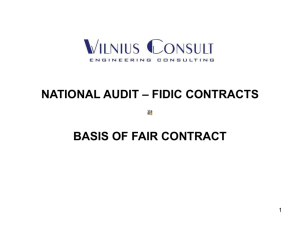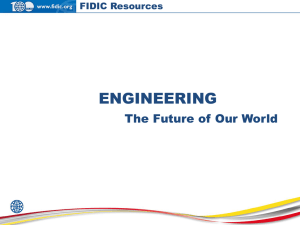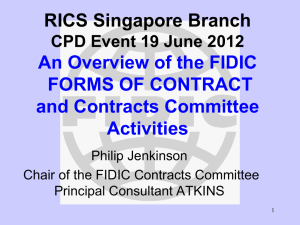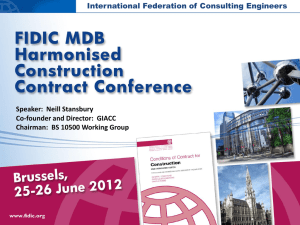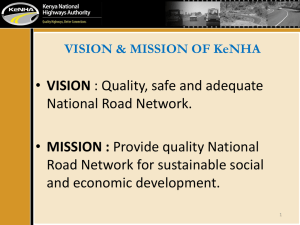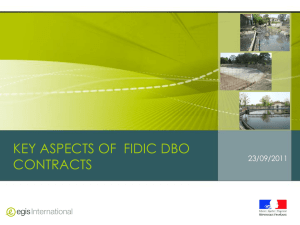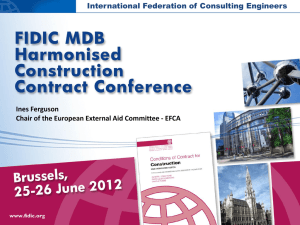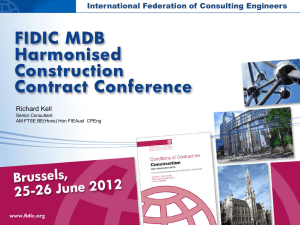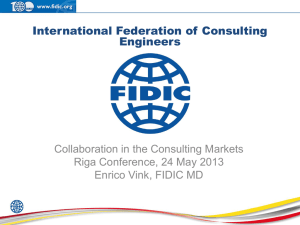NGB - The British University in Dubai
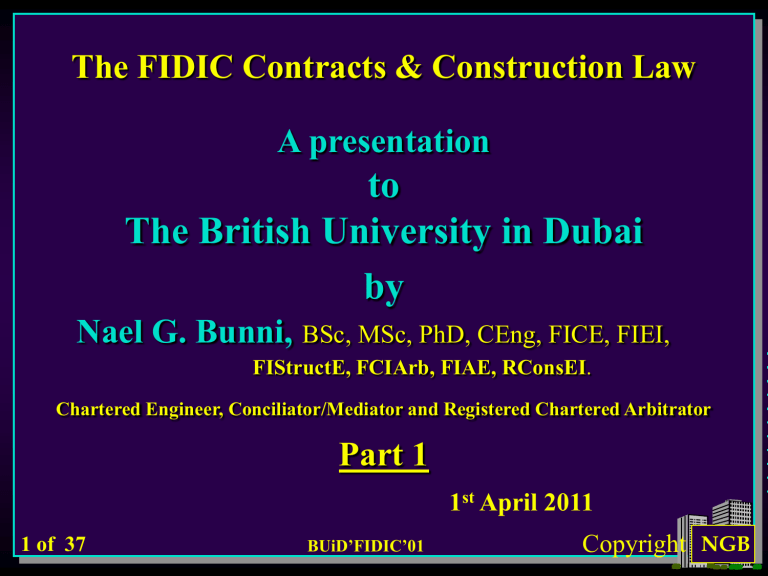
The FIDIC Contracts & Construction Law
A presentation to
The British University in Dubai by
Nael G. Bunni,
BSc, MSc, PhD, CEng, FICE, FIEI,
FIStructE, FCIArb, FIAE, RConsEI .
Chartered Engineer, Conciliator/Mediator and Registered Chartered Arbitrator
Part 1
1 of 37 BUiD’FIDIC’01
1 st April 2011
Copyright NGB
Synopsis
The FIDIC identity;
A survey of the FIDIC Forms of Contract and their distinguishing features and characteristics;
The role of the Engineer and how it compares with the term “Project Manager”;
The framework of contractual and legal arrangements on a FIDIC Construction Contract;
The role of insurance in the construction contract;
The unique feature of seeking to provide for a specific remedy in the event of any breach of the terms of the Contract; &
The procedure set for claims and dispute resolution.
2 of 37 BUiD’FIDIC’01 Copyright NGB
The FIDIC identity
FIDIC - Federation Internationale des
Ingenieurs - Conseils
Founded in 1913 in Ghent , Belgium by the national associations of consulting engineers of Belgium, France & Switzerland
Has grown to represent associations from over 84 countries worldwide
Secretariat is located in Geneva, Switzerland
Contd./2
3 of 37 BUiD’FIDIC’01 Copyright NGB
The FIDIC identity
(Contd/2)
One of the first committees established in 1913 was the Contract Documents Committee.
Its Terms of Reference were:
– To monitor contract documents of interest to consulting engineers regarding:
» construction of objects or works;
» erection and installation of works;
» maintenance of installations in operation; and
» supply of materials
–
To inform contractors, suppliers and officials concerning contract documents recommended by FIDIC
Contd./3
4 of 37 BUiD’FIDIC’01 Copyright NGB
The FIDIC identity
(Contd/3)
First standard form of contract published in
1957
–
It was the first edition of the Red Book for civil engineering works in the international field
–
Since then FIDIC has become known outside the engineering profession for its standard forms of contract
The Red Book was followed by the Yellow
Book for Electrical and Mechanical Works including erection on site
Contd./4
5 of 37 BUiD’FIDIC’01 Copyright NGB
The FIDIC identity
(Contd/4)
Standard Forms & Associated Documentation
–
Conditions of Contract for Works of Civil Engineering
Construction (Red Book), 4th Edition, 1987; updated in 88 & 92
– Conditions of Contract for Electrical and Mechanical Works including erection on site (Yellow Book), 3rd Edition, 1987
–
Conditions of Contract for Design-Build and Turnkey (Orange
Book), 1st Edition, 1995
–
Conditions of Sub-contract for Works of Civil Engineering
Construction, 1st Edition, 1994
–
Tendering Procedure, 2nd Edition, 1994
–
Client/Consultant - model services Agreement (White Book), 3rd
Edition, 1998; 4 th Ed. 2006
–
Joint Venture (Consortium) - Agreement, 1st Edition, 1992
–
Sub-consultancy Agreement, 1st Edition, 1992
– Dredging & Reclamation Form of Contract, 1st Edition, 2006
6 of 37 BUiD’FIDIC’01 Copyright NGB
The FIDIC identity
(Contd/5)
First Edition of the Green Book – Short Form of
Contract – Agreement, General Conditions, Rules for Adjudication and Notes for Guidance;
The 1999 Red Book – Conditions of Contract for
Construction, (for Building and Engineering Works,
Designed by the Employer) – General Conditions,
Guidance for the Preparation of the Particular
Conditions, Forms of Tender, Contract Agreement, and Dispute Adjudication Agreement, 29,775 words;
7 of 37 BUiD’FIDIC’01 Copyright NGB
The FIDIC identity
(Contd/6)
First Edition of a new Yellow Book: Conditions of
Contract for Plant and Design-Build for Electrical and Mechanical Plant, and for Building and
Engineering Works, Designed by the Contractor –
General Conditions, Guidance for the Preparation of the
Particular Conditions, Forms of Tender, Contract Agreement and Dispute Adjudication Agreement, 30,408 words; and
First Edition of the Silver Book: Conditions of
Contract for EPC turnkey Projects – General
Conditions, Guidance for the Preparation of the Particular
Conditions, Forms of Tender, Contract Agreement and
Dispute Adjudication Agreement, 26,792 words.
8 of 37 BUiD’FIDIC’01 Copyright NGB
Other Developments since 1999
The Harmonised Multilateral
Development Banks Form of Contract,
1 st Ed. 2005, 3 rd Ed. 2010
The Dredging & Reclamation Works, 1 st
Ed. in 2006
The most important development is the introduction of the “Gold Book” in 2009
The Test Ed. of The Subcontract Form for the 1999 Red Book, published in
December 09
9 of 37 BUiD’FIDIC’01 Copyright NGB
The Harmonised MDB Form
MDB: The Harmonised Multilateral
Development Banks Form of Contract, 2005;
Intended for MDB funded projects;
FIDIC retains copyright & Management;
Based on the 1999 Red Book, which remains
FIDIC’s recommended Form, but amended shifting many risks to the Contractor, including the reduced Authority of Engineer;
The 3 rd Ed. was issued in 2010
Many changes: for example. Cl. 20.
10 of 37 BUiD’FIDIC’01 Copyright NGB
The DBO Form:
Design, Build & Operate
The Gold Book deals with:
–
Design, Build and Operate (DBO) Projects.
–
It is based on and developed from the 1999 Yellow
Book.
–
It is intended for projects where the employer wishes the contractor not only to design and construct a facility, but also to continue and operate and maintain that facility for a long number of years.
–
Examples of Projects: Water treatment plants,
Power generation plants and manufacturing or process facilities, and motorways/highway projects .
11 of 37 BUiD’FIDIC’01 Copyright NGB
Comparison of the 1999 Forms with previous major forms
Form of Contract Equivalent in the New Forms
Red Book, 4 th Ed. 1992
Red Book, 4 th Ed. With
Suppl. 1996
New Red where the DAB is Adhoc & the
Engineer acts as the DAB
New Red where the DAB is Standing & the
Board is Independent & Impartial
New Yellow, 1999 Yellow Book, 3 rd Ed.
1988
Orange Book, 1 st Ed.
1995
Newly developed
Forms
New Yellow, 1999
Silver Book & Green
Book, 1999
12 of 37 BUiD’FIDIC’01 Copyright NGB
Usual contractual arrangements in a construction project
Employer or Owner
Engineer
Contractor
Sub-contractors
Other
Consultants
Suppliers
Manufacturers
13 of 37
Direct contract
Indirect relationship
BUiD’FIDIC’01 Copyright NGB
Aspects to consider when choosing standard form:
The allocation of the essential functions found in the project and particularly the design function;
The allocation of the risks inherent in the projects;
The allocation of the management role; and
The method and timing of remuneration for the contractor.
14 of 37 BUiD’FIDIC’01 Copyright NGB
15 of 37
1. The allocation of the essential functions found in the project and particularly the design function
BUiD’FIDIC’01 Copyright NGB
The Allocation of Functions
The following functions must be allocated to certain parties:
–
Promoter : Initiator of project or Employer/Owner
–
Financier and his role as:
»
Self financing
» A simple lender
»
A lender in Build - Transfer
» A lender in Build - Own - Transfer BOT
»
A lender in Build - Own - Transfer and Operate BOOT
»
A lender in Build - Own - Operate BOO
»
A lender in Build - Rent - Transfer BRT
»
BLT in leasing rather than renting
Contd./2
16 of 37 BUiD’FIDIC’01 Copyright NGB
The Allocation of Functions (cont.)
–
Designer
»
Sketch design
»
Preliminary design
»
Final design
–
Manager and coordinator of various design functions
–
Contractor
–
Sub-contractor, supplier and manufacturer
–
Project Manager** & Safety Controller
–
Supervisor
–
Certifier
–
Adjudicator
–
Operator
17 of 37 BUiD’FIDIC’01 Copyright NGB
Roles under FIDIC Standard Forms
Promoter/Employer
–
Finance and operation of project
Engineer
–
Design in the Red Book, New & Old
– Supervision
–
Certification
– Adjudication in the Old Red & Yellow Books, but with the DAB elsewhere
Contractor
– Construction
– Design in the New Yellow Book, partly in the Old
Yellow; the Orange Book & the Silver Book
18 of 37 BUiD’FIDIC’01 Copyright NGB
The Role & Functions of the Engineer
(a) The Completion of a skilful design incl.:
– preparation of drawings;
– drafting specification for materials & workmanship;
– preparation of a bill of quantities .
(b) The preparation of tender & contract documents and advising on the selection of a contractor.
(c) The supervision & quality control of work on site.
(d) The administration of the contract & evaluation
& certification of the work carried out .
(e) Adjudication of disputes .
19 of 37 BUiD’FIDIC’01 Copyright NGB
The different roles Red Book 1992
Pre - construction Stage [ Steps (a) & (b) ] :
The Engineer acts as an advisor & consultant.
Construction Stage [ Steps (c) & (d) ] :
The Engineer acts as an Agent of the Owner.
Construction Stage [ Step (e) ] :
The Engineer acts as an independent , impartial & neutral professional. (under the
1999 Red Book: only when specifically stated)
20 of 37 BUiD’FIDIC’01 Copyright NGB
The Engineer as a designer
The shape, form and dimensions of the project
The function & performance
The selection of the materials & workmanship
The production of documents
Projection of cost
Establishing timing & sequence of construction
21 of 37 BUiD’FIDIC’01 Copyright NGB
The Engineer as the Employer’s Agent
Implementing & augmenting the design
Quality control
Administration and management
–
Pro-active duties
–
Re-active duties
–
Passive duties
Cost accountancy & certification
22 of 37 BUiD’FIDIC’01 Copyright NGB
The Engineer as a supervisor
To supervise, inspect, oversee, or monitor :
–
Compliance with specified quality
–
Progress in accordance with the planned Programme
–
Budget control as in the cost plan
–
Compliance with safety & other control requirements
23 of 37 BUiD’FIDIC’01 Copyright NGB
The Engineer as a certifier
Valuation of work done & Payments to the
Contractor (Cl. 60); (Cl. 12);
Issue Taking - Over Certificate (Cl. 48); (Cl. 14);
Date of Completion (Cl. 49); (Cl. 8);
Payments to nominated sub-contractor (Cl. 59);
(Cl. 5);
Issue Final Certificate (Cl. 60.8); (Cl. 14.13);
Defects Liability Certificate (Cl. 62.1); (Cl. 14);
Valuation of work done, etc. in case of
Termination (Cl. 63.2); (Cl. 15).
24 of 37 BUiD’FIDIC’01 Copyright NGB
The Engineer as an adjudicator under the 1992 Red Book
Dispute Reference to the Engineer
–
[84 days for the Engineer to make a decision]
The Engineer gives notice of his decision in writing
– [70 days for Emp. or Cont. to disagree & give notice of intention to commence arbitration]
If notice of intention to commence arbitration is given, then attempt amicable settlement (56 days)
–
[If no settlement, arbitration may then commence. Place, no. of arbitrators & language may be inserted]
ICC Rules apply unless stated otherwise in Part II
– [ Extreme care must be taken in amending this clause]
25 of 37 BUiD’FIDIC’01 Copyright NGB
Impartial or fair –Red 1992 – Clause 2.6
The Engineer to Act Impartially
2.6 Wherever, under the Contract, the Engineer is required to exercise his discretion by:
(a) giving his decision, opinion or consent,
(b) expressing his satisfaction or approval,
(c) determining value, or
(d) otherwise taking action which may affect the rights and obligations of the
Employer or the Contractor he shall exercise such discretion impartially within the terms of the Contract and having regard to all the circumstances.
…………
26 of 37 BUiD’FIDIC’01 Copyright NGB
Impartial or fair –Red 1999 – 3.1
3.1 Engineer’s Duties and Authority
………….. . The Engineer may exercise (his) authority ……. as specified in or necessarily to be implied from the Contract. ………………..
Except as otherwise stated in these Conditions:
–
(a) whenever carrying out duties or exercising authority, specified in or implied by the Contract, the Engineer shall be deemed to act for the
Employer;
–
(b) the Engineer has no authority to relieve either
Party of any duties, obligations or responsibilities under the Contract; and
27 of 37 BUiD’FIDIC’01 Copyright NGB
Impartial or fair –Red 1999 – 3.1
–
(c) any approval, check, certificate, consent, examination, inspection, instruction, notice, proposal, request, test, or similar act by the Engineer
(including absence of disapproval) shall not relieve the Contractor from any responsibility he has under the
Contract, including responsibility for errors, omissions, discrepancies and non-compliances.
28 of 37 BUiD’FIDIC’01 Copyright NGB
Impartial or fair –Red 1999 – 3.5
Determinations 3.5
Whenever these Conditions provide that the Engineer shall proceed in accordance with this Sub-Clause 3.5 to agree or determine any matter, the Engineer shall consult with each Party in an endeavour to reach agreement. If agreement is not achieved, the Engineer shall make a fair determination in accordance with the
Contract, taking due regard of all relevant circumstances.
29 of 37 BUiD’FIDIC’01 Copyright NGB
2. The allocation of the risks inherent in the project;
30 of 37 BUiD’FIDIC’01 Copyright NGB
The Allocation of Risks &Liability
Law of contract allocates risks to contracting parties.
Standard Forms affirm that allocation or re-allocate risks to another contracting part or third party.
For Civil Engineering Construction the following concepts must be borne in mind:
– The meaning and significance of “Risk”;
–
Not all undesirable events can be perceived and identified; and
–
Whilst risks generally imply undesirable consequences, in certain circumstances desirable as well as undesirable consequence may occur
31 of 37 BUiD’FIDIC’01 Copyright NGB
DEFINITIONS:
RISK: ‘ The combined effect of the probability , or frequency, of occurrence of a defined hazard and the magnitude of the consequences of the occurrence. ’
– B.S. 4778, 1991.
Australia/New Zealand Risk Management
Standard AS/NZ 3951: 1995: hazard is replaced by event, which includes positive as well as negative consequences.
32 of 37 BUiD’FIDIC’01 Copyright NGB
DEFINITIONS:
HAZARD: ‘A situation that could occur during the lifetime of a product, system or plant that has the potential for human injury, damage to property, damage to the environment, or economic loss’.
RISK = “Hazard” x Probability of occurrence
33 of 37 BUiD’FIDIC’01 Copyright NGB
34 of 37
3. The allocation of the management role; and
The method and timing of remuneration for the contractor
BUiD’FIDIC’01 Copyright NGB
Management, Timing & Method of Remuneration
When allocating risks and functions, the promoter or employer should consider:
–
Management and method of valuing work done and its payment
–
Is he prepared to share risks with other parties
–
Extent of such sharing
35 of 37 BUiD’FIDIC’01
Contd./2
Copyright NGB
Management, Timing & Method of
Remuneration
(Contd./3)
Categories to consider depending on the extent of risk accepted:
–
Cost-reimbursable contracts
»
May be sub-divided depending on sums to be added
–
Re-measurement contracts based on unit rates and prices. May be sub-divided into:
Bill of quantities & Schedule of rates
– see next slide
36 of 37 BUiD’FIDIC’01 Copyright NGB
Management, Timing & Method of
Remuneration
(Contd./2)
–
Lump sum contracts. May be subdivided into:
»
Fixed price
»
No sharing of risks
»
Limited sharing
37 of 37 BUiD’FIDIC’01 Copyright NGB
